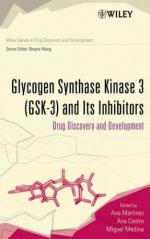|
This section contains 294 words (approx. 1 page at 300 words per page) |
Like fat, glycogen is a source of stored energy in the body. However, glycogen is composed of glucose rather that fat. Glucose, a simple sugar molecule, is the main fuel for many of the body's energy needs. Like other large molecules built from smaller sugar molecules, glycogen is a carbohydrate.
Glycogen occurs mostly in the liver and in muscles. The glycogen in the liver serves energy needs throughout the body. It is particularly important for the brain that requires glucose for proper function but cannot store the fuel itself.
Whenever there is more glucose than is required for the body's immediate needs--such as after a meal--glycogen synthesis is increased. The synthesis is aided by the enzyme, glycogen synthase. (Enzymes are protein molecules that trigger speedy chemical reactions.)
Glycogen synthase exists in inactive and active forms. The inactive form becomes active when it is switched on by insulin. Insulin is a hormone that is secreted by the pancreas in response to high glucose levels in the blood. Blood glucose levels normally rise following meals.
Excess glucose molecules are first tagged with another molecule, UDP or uridine diphosphate, to form UDP-glucose. The UDP serves as a signal to the activated synthase that the glucose may be stored for future use. One by one, the glucose molecules are added to a growing glycogen molecule like links in a chain.
As the body uses up available glucose, it draws on glycogen for more. Glycogen is broken down during glycogenolysis, the process which releases glucose. Glycogenolysis requires the enzyme, glycogen phosphorylase. Like the synthase, the phosphorylase exists in active and inactive forms and requires a hormone to be activated. The necessary hormone is glucagon, which is secreted by the pancreas when blood glucose levels get too low.
|
This section contains 294 words (approx. 1 page at 300 words per page) |


